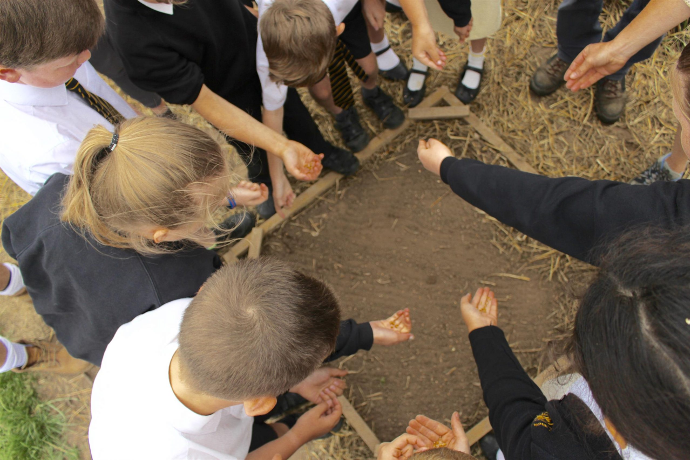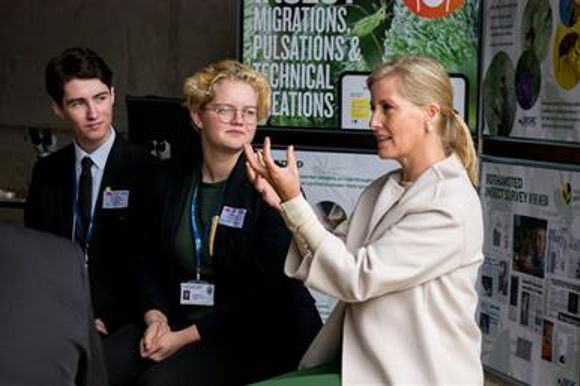
At the LEAF (Linking Environment and Farming) Education and Public Engagement Conference a few weeks ago, LEAF presented the results of Rothamsted Research they had commissioned involving over 1000 teenagers across the UK. The outcomes of this research will help shape new strategies within the Agrifood industry to better their engagement with the next generation.
Included in this research was a teenage empowerment event day at The Farm School, Harpenden, where the views of our next generation on the future of farming, sustainability and our environment were aired and valued.
Currently within the national school curriculum there is little room for the teaching of food provenance. Technology and indoor lifestyles are additional barriers to reconnecting our young people with nature; but they don’t have to be! Initiatives such as Facetime a Farmer by LEAF and The Watercress Company’s live broadcasting to 1000s of pupils are making farming education more accessible to schools. Farm Schools are starting to provide rural locations for teaching days and even a future possibility of ‘teaching the teachers’ at their venues. So, I’m optimistic that gradually we can build on the enthusiasm of our young in caring for the environment and increase their awareness of Agrifood; I’m looking forward to promoting this further on my various school visits next year.
Having practiced as a Vet for 15 years and now working in the field of Nutrition, I’m fascinated by ‘One Health’; the concept that healthy soils and sustainable farming practices lead to healthy livestock and crops. This food is our fuel; along with our lifestyle choices it acts as a preventative medicine in determining our long-term health. This brings me onto an exciting area of diet-related research which is inexplicably linked with our Agrifood practices. You will have found it hard to ignore the latest media buzz phrases of ‘Gut Health’, be ‘Gut Healthy’ or ‘follow your gut instinct’. I’m all about evidence-based nutrition advice; the evidence for the role of our own gut bacteria in our health is now overwhelming and undoubtedly the future of medicine in years to come. We’ve evolved in a microbial environment so it’s no surprise that research is now showing many crucial roles for our own gut bacteria in optimising our long-term health.
I was privileged to hear Prof Tim Spector from King’s College, London, share his pioneering research as Director of the Twins UK Registry into the effects of our gut bacteria on our health at the Royal Society of Medicine recently. We now know from rapidly growing research in this area that these trillions of bacteria residing in our large intestine have a vital role in the development of our immune system and are protective against disease from allergy to some cancers and mental health. They may even explain why some of us are more prone to weight gain than others and undoubtedly have a role in the prevention of Obesity and Diabetes. Known as our Microbiome, these gut bacteria possess 300 x our own 20,000 genes. The good news is we can all enhance these crucial microbes just by altering our food choices. Prof Spector went to extreme lengths to demonstrate this by living with an African tribe recently for 4 days. Living extremely close to their land, their food and lifestyle practices nurture their microbiome; Prof Spector’s had improved in its diversity by 40% after the experience! This of course is the extreme, but less obsession with hygiene and an increase in sustainable farming practices promoting soil health are steps in the right direction towards better gut health. Most importantly, I’m a Nutritionist after all, eating as wide a range of seasonal vegetables and therefore fibre, as possible is the best thing you can do straight away to nurture these vital health promoters! They gain their energy from fermenting the fibre in our food which we are otherwise unable to digest. The products released from this fermentation; so-called metabolites are the key to their beneficial effects on our health. You can read more about tending your gut bacteria here
The last stop on my recent travels was a wonderful day with Chalkstream Foods (new website coming soon!) in the spring fed, minerally rich and naturally filtered waters of Hampshire. Producing rainbow trout on the two most famous chalkstream rivers in the world, the Tess and the Itchen, they pride themselves in their sustainable farming practices. At Greatbridge Farm in Romsey, I learned more – the fast flow of high quality chalkstream water that they are swimming against producing exceptionally lean fish; trout are extremely efficient at converting their food into a highly digestible and complete source of protein. Our consumption of fish in the UK is below the recommended Public Health England (PHE) intake of at least two portions each week. I hope to help build awareness of British Trout as a fabulous source of vital anti-oxidants, high quality protein, Omega 3 and some Vitamin D too. To read more about why these are all essential (yet low) in our diet, head to https://lwnutrition.co.uk/
A visit to Frankyn’s Fish Farm in New Alresford on my home journey provided yet more beautiful scenery and learning opportunity and I’m extremely grateful to all my hosts.
Tucking into our freshly caught trout and watercress with my family that evening, I for one, felt very connected with our land, as did our two teens!
Share:
You may also be interested in...

















